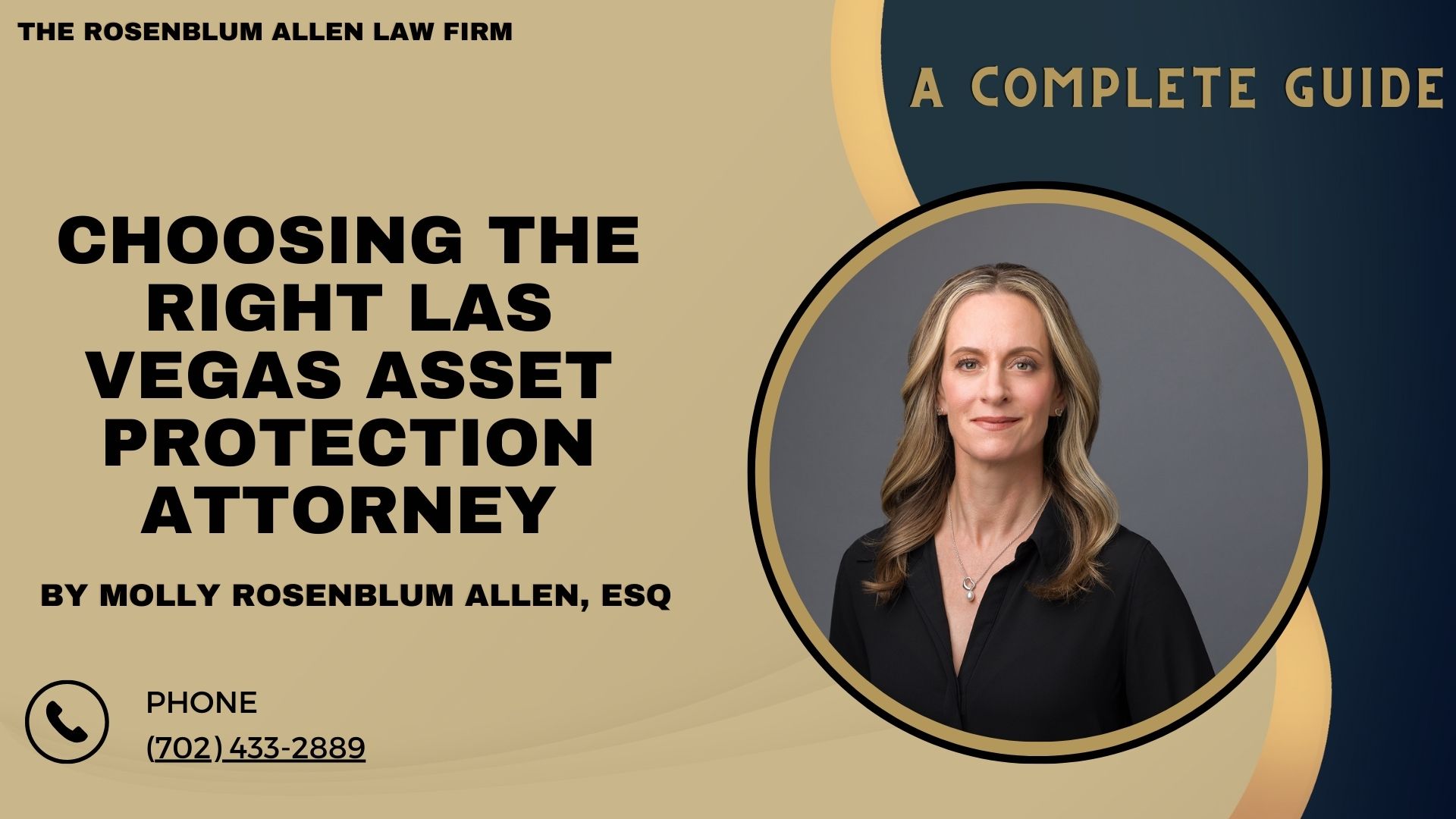Safeguarding your hard-earned wealth is crucial. The stakes are high, especially in bustling Las Vegas. Here, fortunes can change overnight. Protecting your assets isn’t just wise—it’s necessary. That’s where a skilled Las Vegas asset protection attorney comes in. This guide will walk you through asset protection. It sheds light on how a good attorney can help strengthen your finances against threats.

Understanding Asset Protection
Definition and basics of asset protection
Asset protection is a planning process. It aims to secure your wealth from creditors, lawsuits, or judgments. It’s about putting legal mechanisms in place. They ensure your assets remain untouched. This allows you peace of mind and financial stability.
What is asset protection?
Asset protection is the art of structuring your wealth to minimize risk. It ensures your assets are safe from legal threats.
Critical concepts in asset protection
Legal Tools and Structures: Utilizing trusts, business entities, and other legal tools to safeguard assets.
Risk Management: Identifying potential risks and implementing strategies to mitigate them.
Compliance: Ensuring all asset protection strategies adhere to state and federal laws.
The role of an asset protection attorney
Navigating the complex web of asset protection requires expertise and experience. A good asset protection attorney is key. They craft and use effective strategies tailored to your unique situation.
Legal strategies for asset protection
Trust Formation: Designing trusts that offer robust protection for your assets.
Entity Creation: Establishing LLCs, corporations, and partnerships to shield business assets.
Contractual Agreements: Drafting prenuptial agreements and other contracts to protect personal assets.
How an attorney can help safeguard your assets
Personalized Planning: Develop a customized asset protection plan that aligns with your financial goals.
Legal Guidance: Offering effective advice on the most effective legal tools and strategies for your situation.
Ongoing Support: Providing continual legal support to adapt your asset protection plan as your financial situation evolves.

Asset Protection Strategies in Las Vegas
Nevada-specific asset protection laws
Nevada stands out. It has a favorable legal framework that makes it a haven for asset protection. The state offers unique advantages. They can greatly boost the security of your assets.
Strong Privacy Laws: Nevada’s laws are designed to protect individuals’ privacy, making it harder for creditors to identify and access assets.
Favorable Trust Laws: The state offers some of the most advantageous trust laws in the country, including provisions for self-settled spendthrift trusts.
Types of asset protection trusts available in Nevada
Nevada’s laws offer many types of trusts. They are made to shield your assets from creditors, lawsuits, and judgments.
Domestic Asset Protection Trust (DAPT)
Features and benefits of DAPTs: Nevada DAPTs allow you to transfer assets into a trust, protecting them from creditors while you still enjoy the benefits.
Establishing a DAPT in Nevada: The process involves selecting a qualified trustee, drafting a trust agreement, and transferring assets into the trust.
Spendthrift Trusts
Definition and advantages of spendthrift trusts: These trusts prevent beneficiaries from squandering their inheritance and offer protection against creditors by restricting the beneficiary’s access to trust funds.
How spendthrift trusts complement asset protection: By including spendthrift provisions, you can ensure that the assets within the trust remain out of creditors’ reach.
Business entity formation for asset protection
Creating a business separates personal assets from business liabilities. It offers an extra layer of protection.
Limited Liability Companies (LLCs) and Family Limited Partnerships (FLPs)
Advantages of LLCs and FLPs in asset protection: These entities limit personal liability for business debts and lawsuits, protecting personal assets from business-related legal issues.
Steps to form LLCs and FLPs in Nevada: The process includes filing the necessary paperwork with the Nevada Secretary of State, creating an operating or partnership agreement, and adhering to state regulations for maintenance and compliance.
This section provided a basic understanding of asset protection. It outlined the legal strategies in Las Vegas. It covered the entities available to safeguard your assets. With this knowledge, you’re better equipped. You can consider how an asset protection attorney can help secure your money.

Choosing the Right Las Vegas Asset Protection Attorney
Finding an attorney is crucial. They must navigate the nuances of Nevada’s asset protection laws. But it’s not just about legal know-how. It’s about finding someone who shares your financial goals. They must understand your unique situation.
Qualities to look for in an asset protection attorney
When searching for your legal guardian in asset protection, look for these key qualities:
Experience and expertise in Nevada asset protection law: They should have a proven track record in creating effective asset protection strategies within Nevada’s legal framework.
Successful case histories in asset protection: Look for an attorney who has successfully protected assets like yours from various threats.
How to find and vet potential attorneys
Finding the right attorney can seem daunting. But, with a smart approach, you can confidently navigate it.
Researching and reviewing attorney credentials and client testimonials
Start by diving deep into the digital world:
Law Firm Websites: These often provide detailed bios, including an attorney’s experience, areas of expertise, and notable cases.
Online Reviews: Platforms like Google and legal-specific review sites can offer insights from previous clients.
Preparing for your initial consultation
Walking into your first meeting well-prepared can make all the difference. Here’s how to gear up:
Questions to Ask: Prepare a list of questions covering their experience, asset protection approach, and how they see your case unfolding.
Understanding attorney fees and services offered: Get clarity on how they charge (hourly vs. flat fee) and what services are included so there are no surprises down the line.

Common Mistakes in Asset Protection
Even with the best intentions, people often stumble when protecting their assets. Awareness of these pitfalls can save you from making the same errors.
Delaying asset protection planning
Procrastination is the enemy of asset protection. The longer you wait, the more vulnerable your assets become. The key takeaway? Start now. Waiting until a lawsuit is filed, or a creditor knocking could be too late.
DIY asset protection strategies
It’s tempting to go the DIY route to save on costs. But, asset protection is complex and full of potential missteps. The consequences of getting it wrong can be far more costly than any upfront savings.
Misunderstanding asset protection and bankruptcy laws
Bankruptcy laws can significantly impact asset protection strategies. Many think all asset protection methods always work against bankruptcy. But, that’s not true. Understanding the interplay between these areas is crucial.

Asset Protection and Estate Planning
Integrating asset protection with estate planning creates a full way to secure your legacy. This two-part strategy preserves your wealth for future generations. It also protects it from immediate threats.
The intersection of asset protection and estate planning
Effective asset protection planning doesn’t happen alone. It should be part of a broader estate plan. This approach protects your assets from creditors and lawsuits. It also sets them up efficiently for inheritance.
Tools and techniques for integrating asset protection into estate plans
Combining estate planning with asset protection involves several vital tools and strategies:
Trusts and Wills: Tailor these documents to include asset protection measures.
Estate Planning Instruments: Utilize powers of attorney, health care directives, and other tools to ensure comprehensive protection.
You must see asset protection as part of your estate planning. It makes a strong strategy. It shields your assets today and secures your legacy for tomorrow.
This comprehensive overview provides:
The groundwork for understanding the importance of asset protection.
The steps for finding the right attorney.
Common pitfalls to avoid.
The synergy between asset protection and estate planning.
With this knowledge, you can take proactive steps. You can use them to secure your financial future in Las Vegas.

Breaking It All Down
We’ve journeyed together through the maze of asset protection in Las Vegas. We’ve unraveled the basics and uncovered Nevada’s unique legal advantages. Securing your assets is about more than just safeguarding your wealth. It’s about ensuring the future prosperity of you and your loved ones. The right Las Vegas asset protection attorney is not just a legal advisor. They are a guardian of your financial legacy.
Remember, asset protection is a proactive pursuit. It’s about taking strategic steps today to avoid financial perils tomorrow. You may be an entrepreneur riding the highs and lows of business ownership. Or, a retiree looking to keep a lifetime of hard work. Or, somewhere between. You cannot overstate the importance of protecting what you’ve built.
Choosing the right attorney will set you on a path of security and peace of mind. Look for someone with expertise and a successful track record. They need empathy to get your unique situation. They need dedication to guard your assets as if they were theirs.
It’s tempting to view asset protection as a set-it-and-forget-it strategy. But, remember that it’s an evolving process. Life changes, and so do laws and financial landscapes. Regular meetings with your attorney can check that your asset protection plan stays strong. It will stay responsive to your changing needs and the outside world.
In closing, starting to protect your assets may seem hard at first. But with the right guide—your Las Vegas asset protection attorney. They’ll make the path clear and your steps confident. Knowing that protecting your wealth is more than just a luxury provides a necessity for peace of mind. After all, Las Vegas is a vibrant, ever-changing city. Securing your assets there means thriving, not just surviving.
Take this guide as your first step towards a more secure financial future. Contact a qualified Las Vegas asset protection attorney today. They will help you lay the foundation for a legacy that lasts. In the end, it’s not just about protecting wealth. It’s about preserving a way of life for you and those you hold dear.

Frequently Asked Questions
What is the difference between asset protection and insurance?
Asset protection uses legal strategies to safeguard your assets from lawsuits and creditors. Insurance gives money for specific losses or damages. Think of asset protection as a legal shield and insurance as a financial safety net.
Can asset protection help with divorce proceedings?
Yes, protecting assets is crucial in divorce. It safeguards assets you want to keep. But, it’s essential to use these strategies before any marital discord. Courts closely examine asset transfers made before divorce.
Is it too late to start asset protection if I’m already facing a lawsuit?
It’s best to start asset protection before legal threats arise. But, there may still be ways to protect your assets, even if a lawsuit is pending. Yet, limited options may face strict legal scrutiny.
How often should I review and update my asset protection plan?
You should review and update your asset protection plan every few years. Also, do so after big life events. These include marriage, divorce, gaining assets, or changes in business ownership. This ensures your plan aligns with your current situation and goals.
Do I need an asset protection plan if I’m not wealthy?
Yes, individuals at all wealth levels can enjoy asset protection. It’s not just about protecting large estates. It’s about guarding your assets from unexpected legal threats.
Can asset protection strategies reduce my taxes?
The main goal of asset protection is to shield assets from legal threats. But, specific strategies may have tax effects. Yet, do not confuse asset protection with tax evasion or avoidance. Consulting with an asset protection attorney can help clarify these aspects.
What’s the difference between a Domestic Asset Protection Trust (DAPT) and an Offshore Asset Protection Trust?
A DAPT is established under the laws of a U.S. state. These laws let DAPTs offer protection against creditors. They can do this while keeping assets within the U.S. legal system. It is set up in a foreign country with good asset protection laws. It may offer better protection but is more complex and costly.
Are all assets eligible for protection through asset protection strategies?
Various asset protection strategies can protect most types of assets. But, there are exceptions and limits. They depend on the asset type, your state’s laws, and the protection strategy in use.
How does an asset protection trust protect my assets from creditors?
An asset protection trust protects assets. It does this by legally transferring ownership of them to the trust. A trustee then manages the trust. This separation limits creditors’ access. The assets no longer belong to you but to the trust.
Will setting up an LLC for my business protect my assets?
Yes, creating an LLC (Limited Liability Company) can protect your assets. It does this by separating them from your business’s liabilities. This means that for business debts or lawsuits, creditors can only go after the business’s assets. They can’t go after yours.

Glossary
Asset Protection: The strategic planning and implementation of legal mechanisms to safeguard assets from potential creditors, lawsuits, or judgments.
Creditor: An individual or entity to whom a debtor owes money.
Debtor: An individual or entity that owes money to a creditor.
Domestic Asset Protection Trust (DAPT): A type of trust established under the laws of certain U.S. states that allows individuals to shield assets from creditors while still benefiting from those assets.
Estate Planning: The process of arranging the management and disposal of a person’s estate during and after death, including the distribution of assets to heirs and the settlement of estate taxes.
Family Limited Partnership (FLP): A limited partnership among family members designed to manage and protect family assets, offering tax benefits and asset protection.
Limited Liability Company (LLC): A business structure that combines the pass-through taxation of a partnership or sole proprietorship with the limited liability of a corporation, protecting personal assets from business debts and claims.
Spendthrift Trust: A trust that includes provisions preventing beneficiaries from squandering their inheritance and protecting the trust assets from the beneficiaries’ creditors.
Trust: A legal arrangement in which one party (the trustee) holds and manages property for the benefit of another (the beneficiary).
Trustee: An individual or entity appointed to manage and administer property or assets on behalf of a trust’s beneficiaries according to the terms of the trust agreement.
Beneficiary: An individual or entity entitled to benefit from a trust, will, or life insurance policy.
Will: A legal document that expresses an individual’s wishes regarding the distribution of their property and the care of any minor children upon death.
Bankruptcy: A legal process through which individuals or businesses who cannot repay debts to creditors may seek relief from some or all of their debts.
Estate Taxes: Taxes levied on an individual’s estate after their death, based on the value of their property and assets.
Litigation: The process of taking legal action; the process of suing someone or defending oneself in a court of law.
Asset Transfer: The act of legally transferring ownership of assets from one individual or entity to another, often used in asset protection and estate planning.
Legal Entity: An organization or structure recognized by the law as having rights and responsibilities, such as a corporation, partnership, trust, or LLC.
Risk Management: The process of identifying, assessing, and prioritizing risks followed by applying resources to minimize, control, or eliminate potential negative impacts.
Compliance: Adherence to laws, regulations, guidelines, and specifications relevant to business processes.

Additional Resources for You
As you navigate through your asset protection and legal needs, remember that our lead attorney, Molly Rosenblum Allen, Esq., has also created a suite of resources designed to assist you in your time of need. With a wealth of knowledge and expertise in estate planning and trust management, these resources are invaluable for anyone looking to secure their financial future and ensure their legacy. Below is a curated list of resources available to you:
Las Vegas Estate Planning Attorney: Your comprehensive guide to estate planning in Las Vegas, offering insights into how to effectively plan your estate with the help of experienced attorneys. Learn more.
Las Vegas Trust Attorney: Discover how setting up a trust can protect your assets and benefit your heirs. This resource provides essential information on choosing the right trust for your needs. Explore here.
Tips On Estate Planning: A collection of practical tips to help you navigate the estate planning process, ensuring that you cover all necessary aspects to protect your estate. Read more.
Estate Planning Checklist: A helpful checklist to guide you through the estate planning process, ensuring you don’t overlook any critical steps. Check it out.
Making a Will: An in-depth look at the importance of making a will, the process involved, and how it fits into your overall estate planning strategy. Learn how.
Estate Planning Services: Overview of the estate planning services offered by our firm, tailored to meet your unique needs and ensure your estate is managed according to your wishes. Discover our services.
Estate Planning Mistakes: A guide to common estate planning mistakes and how to avoid them, ensuring your estate planning is foolproof. Avoid these mistakes.
Estate Planning Probate: Insights into the probate process, how it affects your estate planning, and strategies to minimize or avoid probate for your heirs. Understand probate.
These resources, crafted by Molly Rosenblum Allen, Esq., provide valuable information and guidance to help you through your estate planning and asset protection journey. Whether you’re just starting out or looking to update your plans, these resources are here to support you every step of the way.

Outside Resources for You
To further support your journey in asset protection and estate planning, here are several offsite resources that offer valuable information and insights. These resources can enhance your understanding and assist you in making informed decisions:
American Bar Association (ABA): A comprehensive resource offering insights on various legal topics, including asset protection and estate planning. Visit ABA.
National Association of Estate Planners & Councils (NAEPC): Dedicated to promoting estate planning excellence, the NAEPC offers resources for both professionals and the public. Explore NAEPC.
WealthCounsel: A professional community that provides estate and business planning resources to attorneys, with educational content available for the general public. Check out WealthCounsel.
ElderLawAnswers: Offers information specifically related to elder law, estate planning, and related areas, providing resources to protect assets and plan for the future. Visit ElderLawAnswers.
National Association of Insurance Commissioners (NAIC): Provides information on insurance options that can complement your asset protection and estate planning strategies. Explore NAIC.
The American College of Trust and Estate Counsel (ACTEC): A nonprofit association comprising peer-elected trust and estate counselors who offer insights into estate planning and taxation. Check out ACTEC.
SmartAsset: A financial information platform that offers tools and resources on estate planning, taxes, retirement, and asset protection among other financial topics. Visit SmartAsset.

A Special Message from Our Lead Attorney, Molly Rosenblum Allen, Esq

Dear Reader,
Thank you for exploring our resources on asset protection and estate planning. Thank you for taking the time. I hope you found the information insightful. It was helpful. It helped us understand the complexity of protecting your assets. It also helped us understand the complexity of planning for the future.
Each person’s situation is unique. These resources aim to provide information and guidance. But, often, nothing beats personalized advice. That’s where my team and I come in. We’re here to listen to your needs. We’ll discuss your concerns and make a plan. The plan will protect your assets and secure your legacy.
Please take the next step by calling us at (702) 433-2889. Let’s start on crafting a plan just for you. It will address your situation and goals. We do not offer a free consultation. But, we commit to providing you with great service and expertise. This will start at the beginning of our journey together.
Thank you once again for your trust in us. I look forward to the opportunity to assist you.
Warmest regards,
Molly Rosenblum Allen, Esq.


